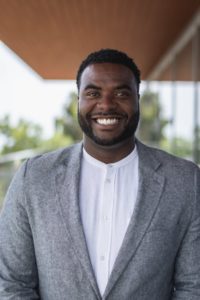 Claremont, Calif. (October 29, 2021)—Pitzer College has named Vince Greer, a student affairs leader with extensive experience in diversity and inclusion initiatives, assistant vice president and dean of students, effective December 1, 2021. Greer will step into the role previously held by Sandra “Sandy” Vasquez, who became vice president for student affairs in July 2021. Greer’s appointment comes after a national search.
Claremont, Calif. (October 29, 2021)—Pitzer College has named Vince Greer, a student affairs leader with extensive experience in diversity and inclusion initiatives, assistant vice president and dean of students, effective December 1, 2021. Greer will step into the role previously held by Sandra “Sandy” Vasquez, who became vice president for student affairs in July 2021. Greer’s appointment comes after a national search.
Calling Greer “an inspirational and transformational leader,” Vasquez said his professional expertise and personal affinity for fostering student development, retention, success, and mentorship amongst diverse student communities “clearly resonated with the search committee and the greater college community.”
“I look forward to the dynamic impact Vince will make to further enhance student success, community belonging, inclusive excellence, and belonging initiatives at the College,” Vasquez said.
Greer comes to Pitzer from Claremont McKenna College (CMC), where he has served as the inaugural dean for diversity and inclusion and director of CMC’s new CARE Center. In that role, he has worked with the CMC community to build capacities across the institution to ensure that students of broadly diverse backgrounds, identities, experiences, perspectives, and ideas are able to thrive. He has also served two terms as co-chair for the 7C Claremont Colleges Inclusive Excellence committee. In addition to CMC, Greer has held a variety of positions at a range of higher education institutions, including DePauw University and Brown University.
Greer said he is honored to be selected to serve as dean of students at Pitzer College.
“I couldn’t be more enthusiastic to join the Pitzer community, a place whose institutional pillars and ethos directly align with my own personal and professional affinities and passions,” Greer said. “I look forward to partnering with our incredibly invested student body and alumni community, globally renowned faculty as well as esteemed staff colleagues across campus and community partners.”
Greer said he is committed to helping cultivate more transformational learning experiences that foster interdisciplinary intellectual inquiry, co-curricular and experiential learning, and intersectional identity development through capacity building, service, and activism.
Originally from the Southside of Chicago, Greer says he is a proud Posse Scholar alumnus. Outside of work, his hobbies include traveling, spending time with his family, DJing, reading, watching, and playing sports—notably basketball.
Greer holds a BA in English Writing from DePauw University and received his Master of Education in Higher Education Administration from Northeastern University. A graduate of the Social Justice Training Institute, he is certified in Social Justice Mediation and a trained University of Michigan Intergroup Dialogue facilitator.